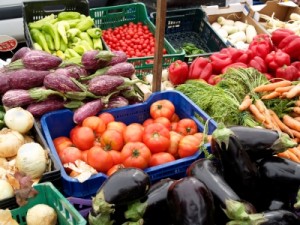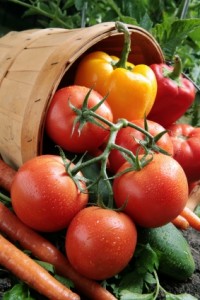The inability of an individual or household to be certain that they will be able to afford to access a healthy and adequate diet for the foreseeable future is dubbed food insecurity. Millions of people in this country live under these conditions everyday.
Research into food deserts / insecurity in the USA has focussed on the distance rural people have to travel to a store selling healthy food (as opposed to a local store selling few fruit and vegetables), and the lack of easy access by poor urban people to healthy food. Lack of urban access and poverty has been exacerbated by poverty and race, and the cost of bus travel from poor areas to good-quality supermarkets. I grew up in Chicago. Major areas of Chicago lack access to healthful food. When I was growing up on the far south side of Chicago there were 3 major mainstream grocery stores within a 10 minute car drive from my house. My grandma and mother still live in that neighborhood. There are now zero grocery stores in that neighborhood. My mom drives my 85 year old grandma over 35 minutes by car once a week to purchase groceries. Everywhere my grandma used to shop has moved away.
I honestly have no idea how she would get to the store without my mom’s help and support. My grandma does not have a car and has never driven. My grandma is one of the 609,034 Chicagoans who live in what’s known as a food desert, a concentrated area short on access to fresh meat and produce, but over flowing with the packaged and fried food and a large number of convenience stores and fast-food outlets. The majority of people who live in these deserts-whether urban or rural are poor. A good number of these people do not have cars– so shopping more than likely means multi-bus rides, carrying grocery bags. Oh yeah– the majority of folks are also single mothers so add children to the mix. You, 2-3 small children, 5-6 bags and multiple buses …ummm…that does not sound like a good time. That just sounds tiring and honestly like a hassle.
Many simply opt out. Stopping into a KFC or a convenience store instead, where the inventory is sparse at best. You know the place –it often runs more toward hot red cheetos and liquor than kale, and where a banana that would cost 29 cents at a main stream chain goes for around 90 cents, and in all honestly its old and not of good quality.
Diet matters. It took me 44 years to realize that . It has a direct link to obesity, diabetes, and other diseases, and you can’t choose a healthy diet if you don’t have access to it.
The food desert is only part of the story. These communities are business deserts as well. They have no retail stores. They are unsafe and blighted. Things in these neighborhoods cost more. The cost of being poor is that you pay more. If you can not find healthy food locally, the odds are you will not be able to find too many other essential items as well.
Some communities are starting community gardens and launching farmer’s markets. My grandma always planted a wondeful garden and we had many yummy nutritious meals because of that. As she has gotten older that becomes more and more difficult for her, even with family help and support. I would much rather see these options being utilized more than bringing in a big box store.In my old neighborhood community leaders are tackling this problem.
Meantime, everyone agrees on the necessity for more education—the sort of learning that would change eating and cooking habits and encourage residents to shop at the grocery stores when, or if, they open. “What we need, we have to support,” says A. Edward Davis Jr., pastor of Roseland’s St. John Missionary Baptist Church, who gathered with fellow community members in late March to discuss the neighborhood’s lack of fresh food. “Once we get the stores back, we’ve still got to understand that we’re losing people in these communities, and African Americans in particular, because we’re not eating enough fruits and vegetables, and we’re not cooking,” says the public health department’s Mason.
Poverty is a major cause of poor eating habits. People generally know what they should be eating but cannot afford such foods. Poorer mothers may feed the children well but subsist on packaged food for them. Grocery stores, farmer markets, community gardens all help to anchor communities and are vital keys to neighborhood revitalization and stability. Health and Wholeness is everyone’s divine birthright.


